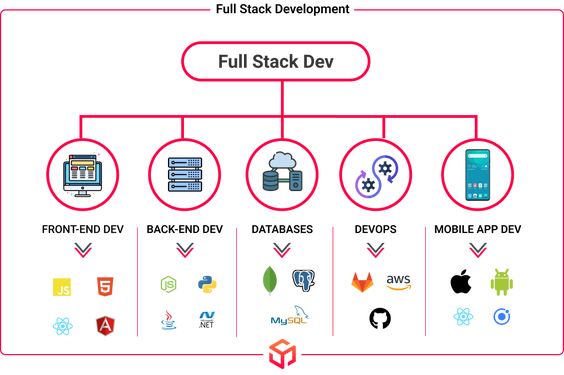
Web_Development
August 27, 2024
Key Skills for Full-Stack Developers


Web_Development
August 27th 2024

By Super Admin User
5k
5k
5k

40 share

08 Tweet

20 Subscriber
Development Frameworks : Full-stack developers use various frameworks and libraries to streamline development. Popular front-end frameworks and libraries include React, Angular, and Vue.js, which assist in creating interactive user interfaces. For the back-end, frameworks such as Express, Django, and Ruby on Rails provide robust tools for server-side operations and rapid development.
Version Control Systems : Tools like Git and platforms such as GitHub are essential for version control, allowing developers to track changes, collaborate with others, and manage code repositories effectively.
Deployment and Hosting : Knowledge of cloud platforms like AWS and Heroku, along with containerization tools such as Docker, simplifies the deployment and scaling of applications. These technologies help ensure that applications are efficiently managed and scalable.
Code Quality and Testing : Maintaining high code quality and conducting thorough testing are critical for ensuring the reliability and maintainability of applications. Adhering to best practices in these areas helps prevent errors and ensures a stable product.
Continuous Integration and Deployment (CI/CD) : Implementing CI/CD pipelines automates the testing and deployment processes, which speeds up development and reduces the likelihood of errors. This practice helps streamline workflows and improves overall efficiency.
Security Practices : Employing robust security measures, such as data encryption and secure coding techniques, protects applications from vulnerabilities and threats. Regular updates and audits of security protocols are essential to safeguard against potential risks.
Staying Updated with Technology Trends : The technology landscape is constantly evolving. Full-stack developers must stay informed about the latest trends, tools, and frameworks to remain competitive and relevant in the field.
Pursuing Certifications and Advanced Courses : Gaining certifications and completing advanced courses can enhance a developer’s skills and open up new career opportunities. Continued education helps in mastering new technologies and advancing in the field.
Participating in Developer Communities : Engaging with online forums, attending meetups, and contributing to open-source projects fosters continuous learning and professional growth. Being active in developer communities can provide valuable insights and networking opportunities.
Full-stack developers play a vital role in modern web development, balancing multiple responsibilities across both front-end and back-end technologies. Mastering a diverse set of skills, including technical abilities and essential soft skills, positions developers for success in this dynamic field. By embracing best practices and staying informed about industry trends, full-stack developers can ensure continued growth and achievement in their careers.
.png)
Do you need some help with something or do you have some questions ?
A full-stack developer manages both the front-end and back-end aspects of web development, creating and maintaining comprehensive applications.
Proficiency in HTML, CSS, and JavaScript, along with understanding responsive design and UX principles, are essential for front-end development.
Back-end development focuses on server-side processes, databases, and APIs, while front-end development handles the user interface and client-side interactions.
Essential tools include development frameworks (e.g., React, Express), version control systems (e.g., Git), and deployment platforms (e.g., AWS).
Staying updated involves continuous learning through courses, certifications, and participation in developer communities.







Web_Development
August 27, 2024
Key Skills for Full-Stack Developers

Cyber_Security
August 27, 2024
Ethical Hacking and Legal Considerations

Cyber_Security
August 27, 2024
The Role of Ethical Hacking in Cybersecurity

Cloud_Computing
August 27, 2024
Cloud Services vs. Cloud Computing
.png)
Leave your reply